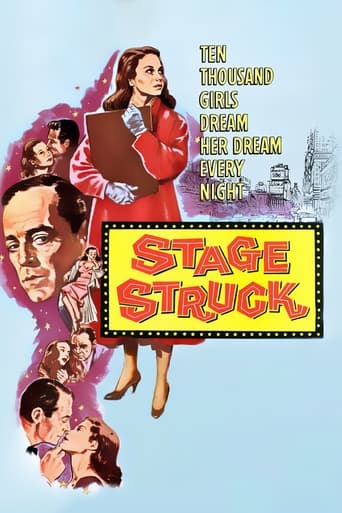pfeffermuse
Some people are born with talent. Some can acquire it. Others can take all the lessons in the world, and still not grasp that elusive "it". And that's the problem with Susan Strasberg's performance: she clearly understands the nuances and subtleties of acting, but cannot connect that knowledge to the empathy and passion an actor must have to be believable in their role.When at the party, Eva Lovelace recites the balcony scene from "Romeo & Juliet", and the guests become transfixed, I was never sure if they were staring in awe or horror. Strasberg pauses and reflects on her words perfectly -- at these moments, one could believe she's Juliet watching and waiting for her lover's answers. But when she recites the words -- and a recitation is all it is -- the fire, the passion of Juliet for Romeo is non-existent. She could just as easily have been telling the doorman to call her a cab.The most interesting aspect of the film was in watching the various methods of acting being presented. Herbert Marshall (who started in silents and early talkies), Henry Fonda (who started in film in the 1930s) and Christopher Plummer (one of the new method actors) are all believable in their roles and mesh seamlessly together. Then there's Strasberg, who is incapable of presenting even a fraction of the range of any of her co-stars. (Frankly, I didn't make the connection between her and her father, and wondered who she knew to have secured the role.) The film is interesting as a curio piece, and Lumet's brilliance in portraying New York's scenery. But as a moving story about the theatre, it can't touch "All About Eve".
J B Thackery
I had to keep reminding myself that this film was made in 1958, not in our day. It is "timelessly modern." It's not just another fantasy film about the backstage theater world. The acting is so real and emotions so true, you get caught up in every scene as if you are part of the film. Add the excellent photography and cinematography which seem ahead of their time, and you think you are watching a movie made half a century later.This is not all dreamy, and it is not all hardline: It is a perfect blend of both the aspirations of the heart, and the realities people must overcome to achieve them.The story itself has true personal appeal, as it combines dreams of stardom with down-to-earth human feeling. The directing and acting prove that a halfway decent script can be brought to life, exuding an appeal uncommon in any film of any era.Moreover, this is a fine example of how acting and directing can make a movie entertaining MINUS sleeze and vularity.
Marco Trevisiol
Before this film, I had seen Susan Strasberg in two late 1960s AIP low-budget films 'The Trip' and 'Psych-Out' and enjoyed her performances in both so was quite interested in seeing her in the starring role here.Alas, not only is she not up to the task, but she takes down the film with her. Her performance in the first 30 minutes or so is truly wretched; she's so strained and overwrought that it makes one cringe.To be fair, from the time she does a reading from 'Romeo & Juliet' (which is quite charming) her performance settles down somewhat but the damage is done. After all, it's in the opening scenes where we're supposed to believe that she wins over Herbert Marshall as a close friend and enchants Plummer and Fonda but her performance kills any chance of that being convincing and the film never recovers.However, the film is still fairly entertaining. While Fonda seems rather too genial to convince as a Broadway producer he's always entertaining to watch and helps hold the film together. And Joan Greenwood does a nice balancing act as she gives a melodramatic performance yet still lined with depth.And, as other reviewers have mentioned, director Sidney Lumet puts in some nice touches with the detail he displays in the preparation that goes behind the scenes for opening night.Also of interest is that it was released as an RKO picture and was probably close to the very last film released by that studio.
Rod Evan
Along with "All About Eve" this is one of the finest films dealing with the American theatre. I don't understand why it is a lost film and would urge anybody who enjoys great acting to hunt this film down any way they can. It is also about time it was released on video. Susan Strasberg was clearly one of Hollywood's casualties and it's tragic that the films she made after this were perhaps determined by the mediocre reaction at the time to this film.


